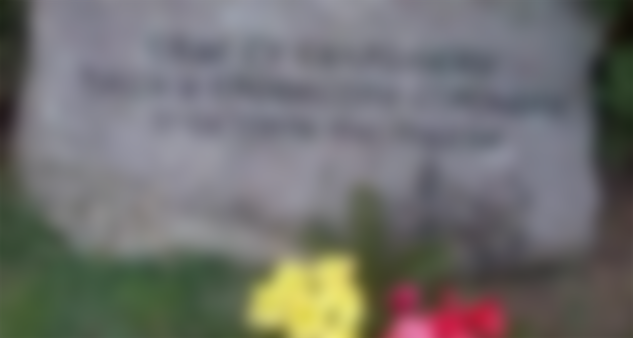Bloody Fairy Tale
It happened in a land of farmers on
hilly Balkan
far, far away;
a troop of students
died martyred
on one single day.
They were all born
in the same year.
For all of them, the school days were the same:
They were all taken
to the same festivals with cheer,
they were all vaccinated
until the last name,
and they all died on the same day.
It happened in a land of farmers on
hilly Balkan
far, far away;
a troop of students
died martyred
in one single day.
And only fifty-five minutes
prior the death moment,
a small troop of fidgets
sat beside their school desks
solving the same hard math quest:
“If a traveler goes by foot,
how much time he needs to rest...”
and so on.
Their thoughts were filled
with same figures and tags
and there was a countless amount
of senseless As and Fs
in their notebooks and in their bags.
They were squeezing
a whole bunch of secrets that mattered--
either patriotic or a love letter--
on the bottom of their pockets.
And everyone of them supposed
that he would for a long time,
for a very, very long time
run under the blue sky--
until all math quests on the world
were done and gone by.
It happened in a land of farmers on
hilly Balkan
far, far away;
a troop of students
died martyred
on the same day.
Whole rows of boys
took each other’s hands
and leaving the last school class
went to the execution quietly,
as the death was nothing but a smile.
All friends in rows were,
at the same moment,
lifted up to the eternal domicile.
"Bloody Fairy Tale" is a song written by the famous Serbian poetess Desanka Maksimovic after hearing the details of the horrific crime in Kragujevac committed by the German occupying forces against the Serbian population. The Kragujevac massacre is one of the greatest and most monstrous crimes in the Second World War, which was committed against civilians in one place and in one day. Workers, peasants, professors and their students died together.
Why a fairy tale and why bloody? Because it is unbelievable that in the twentieth century in Europe, which is proud of its culture and tradition, such an unprecedented massacre took place in which people knowingly and cold-bloodedly kill other people, including children. The suffering of Kragujevac students is so cruel that it surpasses the suffering in fairy tales, and with the title "Bloody Fairy Tale" the poet wants to give it a touch of something incredible and unreal, and yet possible and human.
There is no name of the country where the crime took place, as if it doesn't even matter. It is much more important that the crime really happened in a country of peasants in the Balkans and that one generation of students was killed in just one day. They were all the same, according to the year of birth and the diseases from which they were vaccinated, according to the school obligations and the ceremonies they were taken to, according to their dreams and hopes, and finally, according to the moment when they died. That is the tragedy that the poetess sings about. They did not fight against the German army, they did not forge, nor did they want anyone to die. They were what they are, just students sitting in their classrooms and solving their school assignments. Full of enthusiasm and faith in the future, in human happiness and goodness: they set many plans in front of them and it seemed to each of them that they would run under the arch of blue for a very long time until they completed all the tasks in the world. They had their student secrets and unfulfilled wishes. They believed in themselves, in their bright dreams and golden ideals, unaware that their end was near and that they would become fearless heroes of a bloody fairy tale. At the moment of death, without panic and fear, they held hands and went to the shooting calmly and collectedly, as if death was nothing. That holding of hands symbolizes their comradely brotherhood and shows the last wish of all of them to go forever and leave this earthly life as they lived in it, close, harmonious, equal in everything. Their martyrdom at the beginning of the song, with this move, grew into a heroic death in the last verses of the song. They were heroes, brave and fearless who, with their death, ascended to eternal abode.
With the song "Bloody Fairy Tale", Desanka Maksimovic shows us how life under the occupier's boot can be cruel and unpredictable, and tells us that a criminal mind eager for blood and revenge does not spare anyone, even the youngest ones. With her verses, she expresses her deep irreconcilability with war atrocities and wars in which innocent people, especially children, lose their lives, and she wants to transform the martyrdom of the executed students into eternal life, so that he and their tragic fate are never forgotten.
"Shoot, I'm still holding a class" were the last words of Professor Miloja Pavlović, with whom he went into oblivion. On October 21, 1941, he refused the offer of criminals to save his life, and stood in line with his students and died with them.

_______________________
Krvava bajka
Bilo je to u nekoj zemlji seljaka
na brdovitom balkanu,
umrla je mucenickom smrcu
ceta djaka
u jednom danu.
Iste su godine
svi bili rodjeni,
isti su im tekli skolski dani,
na iste svecanosti
zajedno su vodjeni,
od istih bolesti svi pelcovani,
i svi umrli u istom danu.
Bilo je to u nekoj zemlji seljaka
na brdovitom Balkanu,
umrla je mucenickom smrcu
ceta djaka
u jednom danu.
A pedeset i pet minuta
pre smrtnog trena
sedela je u djackoj klupi
ceta malena
i iste zadatke teske
resavala: koliko moze
putnik ako ide peske...
i tako redom.
Misli su im bile pune
istih brojki
i po sveskama u skolskoj torbi
besmislenih lezalo bezbroj
petica i dvojki.
Pregrst istih snova
i istih tajni
rodoljubivih i ljubavnih
stiskalo se u dnu dzepova.
I cinilo se svakom
da ce dugo,
da ce vrlo dugo
trcati ispod svoda plava
dok sve zadatke na svetu
ne posvrsava.
Bilo je to u nekoj zemlji seljaka
na brdovitom Balkanu,
umrla je mucenickom smrcu
ceta djaka
u istom danu.
Decaka redova celi
uzeli su se za ruke
i sa skolskog zadnjeg casa
na streljanje posli mirno
kao da smrt nije nista.
Drugova redovi celi
istog casa se uzneli
do vecnog boravista.
“Krvava bajka” je pesma koju je srpska poznata pesnikinja Desanka Maksimović napisala nakon što je čula detalje stravičnog zločina u Kragujevcu koji su izvršile nemačke okupatorske snage nad srpskim stanovništvo. Kragujevački pokolj jedan je od najvećih i najmonstruoznijih zločina u Drugom svetskom ratu koji je izvršen nad civilima u jednom mestu i u jednom danu. Zajedno su stradali radnici, seljaci, profesori i njihovi đaci.
Zašto bajka i zašto baš krvava? Zato što je neverovatno da se u dvadesetom veku u Evropi koja se ponosi svojom kulturom i tradicijom desi jedan takav neviđeni masakr u kome ljudi svesno i hladnokrvno ubijaju druge ljude, među njima i decu. Stradanje kragujevačkih đaka toliko je surovo da prevazilazi stradanja u bajkama i naslovom “Krvava bajka” pesnikinja želi da mu da prizvuk nečeg neverovatnog i nestvarnog, a opet mogućeg i ljudskog.
Nema naziva zemlje u kojoj se dogodio zločin, kao da on nije ni važan. Mnogo je važnije da se zločin istinski dogodio u nekoj zemlji seljaka na Balkanu i da je u samo jednom danu ubijena jedna generacija đaka. Svi su bili isti, po godini rođenja i bolestima od kojih su vakcinisani, po školskim obavezama i svečanostima na koje su vođeni, po svojim snovima i nadama i na kraju, po trenutku kada su umrli. U tome i jeste tragika o kojoj peva pesnikinja. Oni se nisu borili protiv nemačke vojske, nisu kovali, niti su želeli ičiju smrt. Bili su ono što i jesu, samo đaci koji sede u klupama i rešavaju svoje školske zadatke. Puni poleta i vere u budućnost, u ljudsku sreću i dobrotu: ispred sebe su postavljali mnoštvo planova i svakom od njih se činilo da će vrlo dugo trčati ispod svoda plava dok sve zadatke na svetu ne posvršava. Imali su svoje đačke tajne i neostvarene želje. Verovali su u sebe, u svoje svetle snove i zlatne ideale nesvesni da im se bliži skori kraj i da će postati neustrašivi junaci jedne krvave bajke. U trenutku smrti, bez panike i straha uzeli se za ruke i pošli na streljanje mirno i pribrano kao da smrt nije ništa. To držanje za ruku simboliše njihovo drugarsko bratsko i pokazuje poslednju želju svih njih zauvek odu i napuste ovozemaljski život onako kako su u njemu i živeli, bliski, složni, po svemu jednaki. Njihova mučenička smrt na početku pesme ovim potezom je u poslednjim stihovima pesme preraslu u junačka smrt. Bili su junaci, hrabri i neustrašivi koji su svojom smrću popeli da večnog boravišta.
Pesmom “Krvava bajka” Desanka Maksimović nam pokazuje kako život pod okupatorskom čizmom može biti surov i nepredvidiv i poručuje nam da zločinački um željan krvi i osvete ne štedi nikoga, čak ni one najmlađe. Svojim stihovima ona izražava svoju duboku nepomirnost sa ratnim zverstvima i ratovima u kojima živote gube nedužni ljudi, posebno deca i želi da mučeničku smrt streljanih đaka preobrazi u večni život, da se on i njihova tragična sudbina nikada ne zaborave.

„Pucajte, ja i sada držim čas“ bile su poslednje reči profesora Miloja Pavlović, sa kojima je otišao u nezaborav. 21. oktobra 1941. odbio je ponudu zločinaca da mu se spase život, i stao je u stroj sa svojim đacima i zajedno sa njima poginuo.


Svake godine 21.10.se zaplačem na času kada deci govorim o Šumaricama i čitam Krvavu bajku!